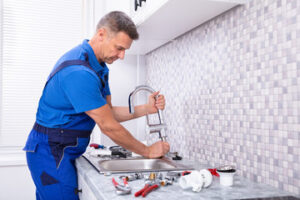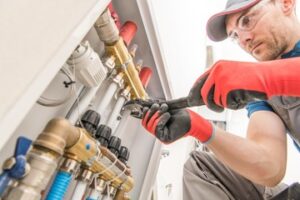Plumber Sarasota does a lot more than unclog toilets and fix faucets. They design and build piping systems that disperse water, remove waste, and heat and cool buildings.

Plumbing systems are crucial for homes, businesses, and industrial settings. Leaks, clogs, and other issues with these systems require immediate attention and often result in serious damage if left unattended.
Job security is a major concern for many young adults. It’s important to consider the career path you choose carefully, especially during times of economic uncertainty. One trade that provides a high degree of job security is plumbing. According to the Bureau of Labor Statistics, there will be a growing demand for plumbers, both for new construction projects and for maintaining and repairing existing plumbing systems. The industry is expected to add jobs over the next 10 years, which is more than twice as fast as the national average.
The demand for plumbers is fueled by a number of factors. The biggest factor is that plumbing is an essential service, meaning that people will always need plumbers to install and repair plumbing systems in their homes and businesses. This ensures that plumbers will continue to have employment opportunities even during difficult economic times.
Another reason that plumbers have a high level of job security is that their work is not easily automated or outsourced. Plumbing is a hands-on job that requires a wide range of skills, including problem-solving and customer service. As a result, it’s unlikely that robots will replace plumbers any time soon.
Plumbers also play an important role in society by ensuring that the public has access to clean water and efficient waste disposal systems. This helps to keep the public healthy and safe, which means that there will always be a need for skilled plumbers.
While there are a few drawbacks to being a plumber, they are not as severe as those associated with some other careers. For example, plumbers often have to work in tight spaces and may need to use heavy equipment. In addition, they may be exposed to hazardous materials like sewage and chemicals, so it’s crucial that they follow safety rules. Another drawback is that plumbers can be required to work odd hours, such as nights and weekends.
Despite the fact that there are some drawbacks to becoming a plumber, this is still an excellent career choice for those who are looking for a stable and secure position. A career in plumbing offers a combination of great pay, job security, and varied work that is interesting and rewarding. It’s also a good option for those who are interested in working with their hands and doing practical work that makes a real difference in the lives of others.
Good Pay
Plumbing is a lucrative career option that offers competitive pay. Unlike some professions that require extensive schooling and student debt, becoming a plumber requires only a high school diploma or equivalent and on-the-job training through an apprenticeship. This allows aspiring plumbers to start earning money right away, and they can often complete their education and gain hands-on experience through a program that is offered by a vocational school or an independent apprenticeship agency.
The demand for plumbers is consistent, regardless of the state of the economy or current financial situation. During economic slowdowns, many home and business owners still need repair services, such as burst pipes or water heater repairs, or may need to install new fixtures and appliances. Additionally, new construction projects may still be underway, requiring plumbers to install plumbing according to building plans and specifications.
As a result, plumbers can expect to have a steady flow of work throughout the year and enjoy a high level of job security. In addition, most plumbers are members of trade unions that negotiate wages and benefits on their behalf, which can further enhance their earnings.
Plumbers are also highly valued for their hardworking and reliable nature. This is because most homeowners and businesses rely on their services for essential functions such as water and sewage management, maintenance, and repairs. As a result, plumbers are in demand during times of emergency or disaster, such as natural disasters or pandemics.
In addition, many plumbing professionals choose to work as independent contractors rather than employees of a specific company. This allows them to enjoy greater flexibility and freedom, including the ability to control their own schedules, choice of clients, and profits. The downside, however, is that this can lead to higher risk of exposure to hazards or injury if proper safety precautions are not taken. This is particularly true when working with hazardous materials, as well as when working in cramped spaces or using power tools. Nevertheless, the positives of this type of career outweigh the negatives, making it an excellent choice for those who want to be in control of their own futures.
Recession-Proof Career
The demand for plumbers remains steady even during economic slowdowns. Unlike many other professions, plumbing is considered recession-proof because water and sewage systems are necessary services that can’t be neglected. In addition to fixing residential problems, plumbers are also needed for new construction projects and maintenance work. This helps them avoid the layoffs and pay cuts that often hit other occupations during tough times.
Getting licensed as a plumber can be a smart career choice for young people who want to start earning right away. The training required for this skilled trade takes less time than a bachelor’s degree, and graduates can start earning a good salary right away without the burden of student loans. In addition, plumbers can often work more flexible hours and earn a higher income than other workers in traditional office jobs.
Another benefit of a plumber program is the ability to work with your hands and be physically active. The job requires a lot of walking, bending, and lifting, so it’s great for those who don’t like sitting at a desk all day. Additionally, the challenges that plumbers face on a daily basis keep them engaged and mentally sharp.
The skills learned during a plumber program prepare you for many different jobs, so you’ll have plenty of options once you get your license. You can work for a plumbing company, a public works department, or even be self-employed and start your own business. Plumbers can also choose to specialize in specific types of plumbing jobs. This allows them to focus on their passion and become experts in a particular field. For example, some plumbers may choose to focus on green plumbing solutions, which help reduce the strain on local water supplies and minimize pollution of natural resources. Others might decide to focus on residential repairs, while other plumbers may choose to specialize in commercial plumbing. The possibilities are endless.
Flexible Hours
There aren’t many jobs that can say they offer a lot of flexibility, but plumbing is one of them. Since there will always be people and businesses in need of plumbing services, plumbers can count on a steady stream of work no matter the economic conditions. This job stability and demand for their skills makes it a great career option, especially if you’re looking for a stable and long-term employment opportunity.
There’s also a lot of variety to the work that plumbers do. From fixing clogs to installing new plumbing systems, there is no shortage of things for plumbers to do. This hands-on work and problem-solving skills can make for a fun and interesting career that’s always challenging. In addition, many plumbers choose to start their own plumbing companies, which gives them more control over their schedules and income.
Plumbers can also expect to be required to perform some hazardous tasks, such as removing and installing gas lines, but they’re typically protected by specialized safety equipment. This includes gloves, goggles, and hard hats, which helps to minimize the risk of injury or exposure to harmful substances. This is important because plumbing is often performed in tight spaces and awkward positions that require some physical exertion.
The plumbing industry is constantly evolving with new technologies and methods. For example, smart plumbing fixtures are becoming more commonplace, and plumbers must keep up with these changes in order to provide their clients with the best service possible. This commitment to lifelong learning can keep plumbers interested in their work and ensure that they remain at the top of their field.
Another reason why so many people love working as plumbers is that they feel like they’re doing something worthwhile and contributing to society. While working in fields such as administration or customer service can leave you feeling like your work doesn’t really add value, plumbing is different. When a plumbing project is completed successfully, it can improve the quality of someone’s life by making their home or business more functional and efficient. This can lead to a more comfortable, healthy lifestyle and a sense of accomplishment.

